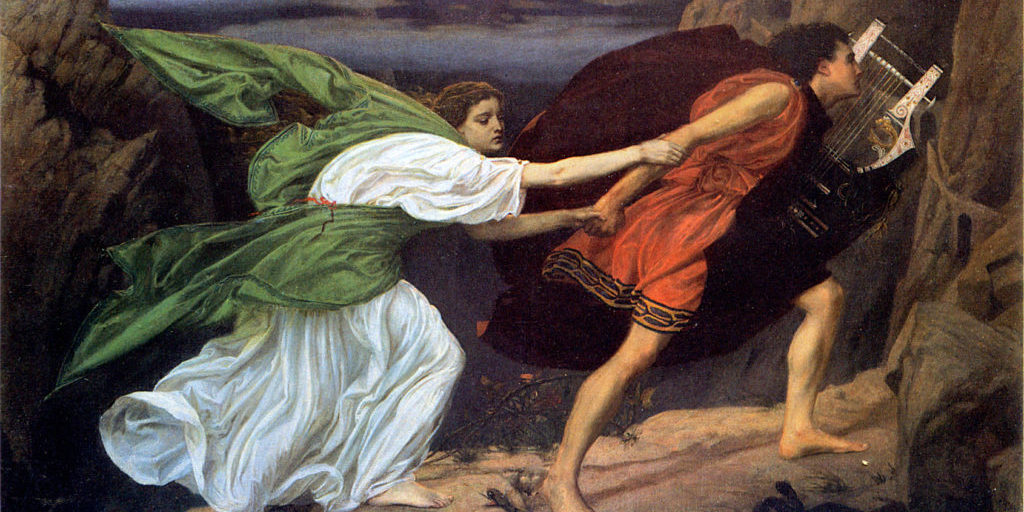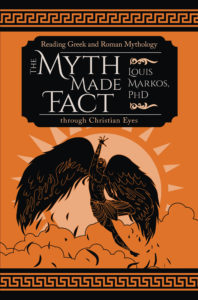
Allegorizing the Greek Myths
Orpheus was not only the king of Thrace; he was the greatest musician the world has ever known. When he played on his lyre, the tallest trees would bend and sway to the music, and the dumb rocks themselves would leap and dance with joy. His was a song of life and growth and fruition.
The Story of Orpheus
One day, his playing drew a lovely nymph named Eurydice out of the bark of a tree. For she was a dryad, one of the wood spirits that haunted the forests in ancient times. The two fell in love and were married in the spring. But their honeymoon was not to last for long. A venomous serpent hiding in the grass bit the unsuspecting ankle of Eurydice. A moment later she was dead, and her soul, grieving, was dragged down to Hades. Early Christian theologians found the allegorical method helpful for opening up difficult passages in the Old Testament and for culling wisdom from the best of the pagan writers. Share on X
Orpheus mourned her for many days, but he refused to accept that her death was final. For a full year, he wandered the earth in search of the pitiless bronze doorway to the underworld. In the end, he found that most desolate of spots and passed, unalarmed, down the endless stairway to Hades. Charon, the ferryman of the dead, tried to prevent the living man from entering his leaky vessel, but Orpheus charmed him with a song and was ferried across the black waters.
Though the moaning of the spirits of the dead caused Orpheus’s face to grow green with fear, he pressed on bravely until he stood before Hades himself, the Lord of the Underworld. He begged the dread king to give him back his Eurydice, but he refused. And so, once again, Orpheus lifted his lyre and began to play an enchanting tune. As he played, he sang a song of love, of its promised bliss and its overwhelming power. Had Hades himself not been impelled by love to kidnap Persephone and take her as his bride?
With each stroke of the strings, the atmosphere of Hades altered and changed. The moaning subsided, and the perpetual fog lifted. The Furies, who had never known pity, began to weep and beat their breasts. Sisyphus, condemned forever to roll a stone up a hill, only to have it roll back each time he reached the summit, ceased his endless labor and climbed up on his rock. There he sat, his chin resting on his fist, and stared at Orpheus in wonder.
Hades the heartless, the unmovable rose from his throne and granted the musician’s request. He could lead his beloved Eurydice back up the stairs to the world of light and life, but on one condition: he must not look back at his bride until she had ascended the last stair.
For most of that long, slow ascent, Orpheus kept his eyes fixed before him, yearning for the light. But as he neared the end of the staircase, he was seized by fear and doubt; perhaps Hades had fooled him and Eurydice was not behind him. What harm would it do to take a quick glance?
Alas, Orpheus, that glance was fatal. Even as you reached out your hand to your beloved, a cold wind blew her down, down into the darkness of hell.
Boethius and Allegorical Interpretation
If the Christian disciple is to continue on his path to the light of God, then he must not, like Orpheus, cast a backward glance at his unregenerate life. Share on X When the pagan allegorists of the ancient world—Plotinus chief among them—read the tale of Orpheus and Eurydice, they discerned in it a deeper spiritual meaning that could be used to train initiates in the way of truth and virtue. But they were not the only writers to do so. Early Christian theologians, beginning with Clement of Alexandria and Origen and climaxing with Augustine and the Medieval Fathers of the Church, found the allegorical method helpful for opening up difficult passages in the Old Testament and for culling wisdom from the best of the pagan writers.
One Christian writer who put a high value on the pre-Christian poets and philosophers of Greece and Rome lived a century after Augustine. His name was Boethius, and he was a respected scholar and man of letters who was appointed a consul of Rome in 510. Alas, fortune is a fickle mistress, and the one-time consul found himself in prison, accused of treason by Theodoric, King of the Ostrogoths—most likely because he stood up for Christian orthodoxy against the Arian beliefs of Theodoric.
Boethius was martyred in 524, but not before he wrote one of the most popular and influential books of the Middle Ages, The Consolation of Philosophy. Although Boethius had written a number of Christian books on a variety of subjects, when he sat down in his prison cell to write his Consolation, he decided to do something unique, something that many a modern preacher and evangelist could learn from.
He decided, for this one book, to confine himself to the kinds and degrees of wisdom available to Plato and Aristotle, Homer and Virgil, Ovid and Cicero. That is to say, Boethius, though he had access himself to the special revelation of the Bible, only included in his Consolation the fruits of general revelation. As part of those fruits, Boethius offers, in Book 3, an allegorical reading of the myth of Orpheus and Eurydice.
Lessons to be Learned
 After meditating on the latter tale, Boethius, in the manner of a higher pagan allegorist, extracts a lesson and an exhortation for all those who seek to lead their thoughts upward toward the light. Such pilgrims must not allow their desires to so overcome them that they lose their focus on the light and turn their gaze toward the darkness beneath the earth. If they do so, if they look on hell rather than heaven, they will lose the beloved prize for which they have sought so boldly and passionately.
After meditating on the latter tale, Boethius, in the manner of a higher pagan allegorist, extracts a lesson and an exhortation for all those who seek to lead their thoughts upward toward the light. Such pilgrims must not allow their desires to so overcome them that they lose their focus on the light and turn their gaze toward the darkness beneath the earth. If they do so, if they look on hell rather than heaven, they will lose the beloved prize for which they have sought so boldly and passionately.
If the Christian disciple is to continue on his path to the light of God, then he must not, like Orpheus, cast a backward glance at his unregenerate life. Rather, he must imitate the journey of St. Paul: “forgetting what lies behind and straining forward to what lies ahead . . . press on toward the goal for the prize of the upward call of God in Christ Jesus” (Philippians 3:13-14; ESV).
Just as Boethius allegorizes the tale of Orpheus and Eurydice in his Consolation, so Paul allegorizes many of the stories of the Old Testament. While not denying the historical truth of the Pentateuch, Paul offers this complex allegorical reading of the Exodus and the wandering in the wilderness:
For I do not want you to be unaware, brothers, that our fathers were all under the cloud, and all passed through the sea, and all were baptized into Moses in the cloud and in the sea, and all ate the same spiritual food, and all drank the same spiritual drink. For they drank from the spiritual Rock that followed them, and the Rock was Christ (1 Corinthians 10:1-4).
Excerpt taken from The Myth Made Fact by Louis Markos, published by Classical Academic Press. © Classical Academic Press® and Louis Markos, 2020. All rights reserved. Used by permission. Subheadings added by the Credo editorial staff.

